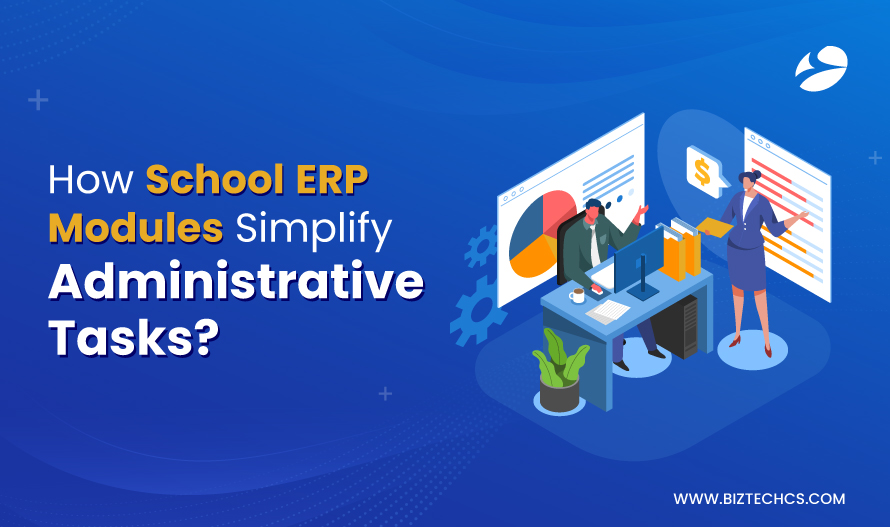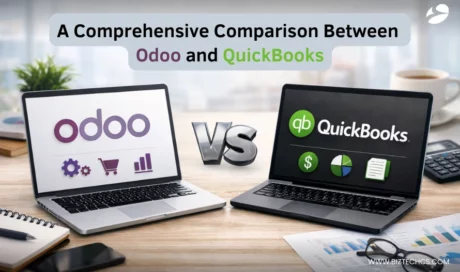2592
How School ERP Modules Simplify Administrative Tasks?
5 min read
2592
5 min read

The task of managing school administration processes is often cumbersome and intricate. Erp (Enterprise Resource Planning) modules used in schools help ease these tasks.
These modules encompass aspects from class attendance to fee payment. This reduces the number of documents to handle, freeing staff to attend to other essential activities.
It also helps reduce errors and enhance an organization’s effectiveness in its core business activities.
The ERP for school management thus reduces complexity and increases effectiveness by automating some tasks.
In this blog, they will learn why it is essential to implement school ERP modules for all administrative procedures and how to select a suitable school ERP system.
Schools face several budget problems, which can be an issue in many spheres. Poor school financing also implies that the institutions cannot hire highly qualified staff or attract and retain qualified staff due to the low wages offered.
It also affects the maintenance of the facility, as there are times when buildings and classrooms need repairs.
The opportunities provided by the programs the students can enroll in may be limited or eliminated, as the program may involve interesting activities of being part of clubs or special classes.
Therefore, administrators in various institutions must make sound decisions concerning resource allocation.
One of the greatest hurdles to any learning institution is attracting and retaining teachers and employees, especially in rural or poorly funded schools.
Some candidates are scarce, others may not wish to work in areas of lesser facilities and less remunerative positions.
After you hire teachers to teach in your institution it is not easy to ensure they remain satisfied and supported mainly because of low finance or lack of professional development.
The staff has to be managed in these conditions, which could be tremendously pressurizing for the school leaders navigating needs against a background of scarcity of resources.
Therefore, there is a high chance that teachers will continue changing employers, making it challenging for a school to create a strong team.
A typical issue school administrators face is the pressure to always adapt to new changes in education policies and curriculum reforms.
In most cases, the government or educational bodies initiate the changes, and the administrators must respond to them. This can be demanding because it involves acquiring new rules and sometimes repeatedly training the staff.
Administrators also need to ensure that the teachers are aware of the changes and implement them correctly.
At the same time, they are very challenging and time-consuming to balance with other daily school management tasks.
One issue that school administrators often encounter is how to engage parents in the education process of their children.
Parents are also occupied with their jobs or other matters, which usually make them unavailable.
Other parents may also opt to disengage because they cannot find ways to assist or do not feel part of the school system.
Achieving these objectives makes it challenging for schools to establish lasting parent-teacher associations.
Consequently, teachers and administrators face immense difficulty in engaging parents and providing them with genuine opportunities to be actively involved.
Technological advancement is another challenge in schools where administrators struggle to keep updated.
They must ensure that teachers and staff are proficient in utilizing newer and improved devices and software.
Overall, having enough time and funds for this training is a challenge. Devices and programs also require replacement or upgrading occasionally, which requires planning and more resources.
If not handled appropriately, using obsolete learning tools is likely to hamper the learning process and cause frustrations among students or instructors.
The issue challenging schools most is having to adhere to set regulations as provided by the government.
All these rules involve a lot of paperwork, which can sometimes take a lot of time. Various audits are performed in this context to ensure the school complies with the prescribed requirements.
Schools are also required to keep records and prove that they have complied with the acts, which is time-consuming. This constant need for accountability can be an exhausting experience for school administrators.
Maintaining school buildings is a constant challenge for administrators. They must keep classrooms, hallways, and facilities in good condition for learning.
Ensuring the safety and security of students requires regular checks and updates to equipment. This can be expensive, especially when budgets are tight. Balancing maintenance needs with financial resources often requires difficult decisions.
One common challenge for school administrators is ensuring clear communication between staff, students, parents, and the community.
In larger schools, this becomes harder due to the number of people involved. When reaching so many different groups, messages can get lost or misunderstood.
Parents may not always receive important updates, and students may miss critical instructions. Administrators must find effective ways to keep everyone informed and on the same page.
Integrating school ERP modules for administration simplifies managing all school data by centralizing it on one platform.
Student records, staff details, and administrative information are stored in one place, making them easy to access and update. This reduces the time spent searching for information and improves efficiency.
Administrators can quickly generate reports and track important data with everything in one system. It also enhances data security, as there is a single, controlled access point for sensitive information.
Integrating ERP modules in school administration makes communication easier and faster. It allows administrators to send quick notifications to teachers, students, and parents.
These can include important alerts about events, schedules, or emergencies. Teachers can easily share updates on student progress, and parents can stay informed. This helps everyone stay connected and reduces miscommunication.
Integrating a school ERP with a streamlined admissions process simplifies the entire workflow for administration.
It automates tasks like application forms, document verification, and student enrollment, cutting down on manual work. This reduces paperwork and speeds up processing, allowing staff to focus on more important tasks.
The system ensures that all steps are completed smoothly without delays, improving the overall efficiency. As a result, both administrators and students benefit from a faster, more organized admissions experience.
Integrating real-time monitoring and reporting in a school ERP system gives administrators instant access to important student data, such as performance and attendance. This allows them to spot issues, such as declining grades or frequent absences, quickly and take timely action.
With up-to-date information at their fingertips, decision-making becomes more efficient and accurate.
It also improves communication between teachers, parents, and staff, ensuring everyone is on the same page. This proactive approach helps in addressing problems early, improving student outcomes.
Integrating attendance management into a school ERP system helps track student and staff attendance automatically.
It reduces the need for manual entry, which reduces errors and saves time. The process becomes even more efficient and secure with options like biometric or RFID integration. This ensures accurate attendance records without relying on paperwork or manual checks.
Overall, it streamlines administrative tasks, allowing staff to focus on more essential duties.
Timetable and scheduling in a school ERP system help automate creating class schedules.
It ensures the best use of resources like teachers and classrooms, avoiding double bookings or empty slots.
This system minimizes conflicts, so teachers and students are available when needed. The ERP also makes quick adjustments possible when changes occur, like teacher absences. This reduces manual errors and saves time for administrators.
Examination and grade management in a school ERP system helps make the exam process smoother.
It automates scheduling exams, so there’s less confusion and manual effort. Teachers can enter grades easily, and the system calculates results accurately. Report cards are generated quickly, reducing time spent on paperwork. This all leads to fewer mistakes and a lighter workload for school staff.
A parent and student portal is a key benefit of integrating school ERP modules for administration.
It allows parents and students to easily access academic progress, attendance, and important updates in real time, which improves communication between teachers, students, and parents.
By having this information available online, parents can stay involved in their child’s education and address issues quickly. The portal helps streamline administrative tasks, making school management more efficient and transparent.
School ERP modules make administrative tasks much easier by automating daily processes. They help schools manage tasks like attendance, fee collection, and scheduling more efficiently, reducing manual errors and saving time for staff.
With ERP systems, schools can also track student performance and communication in one place. We at Biztech are experts at delivering tailored ERP solutions that meet the unique needs of educational institutions. Our team ensures that your school’s processes run smoothly and efficiently with customized ERP tools.

Artificial Intelligence (AI)
294
By Nandeep Barochiya

Odoo
342
By Uttam Jain

Artificial Intelligence (AI)
626
By Nandeep Barochiya